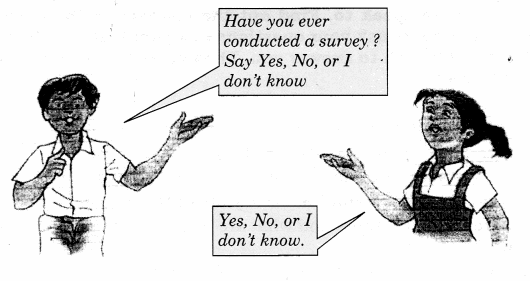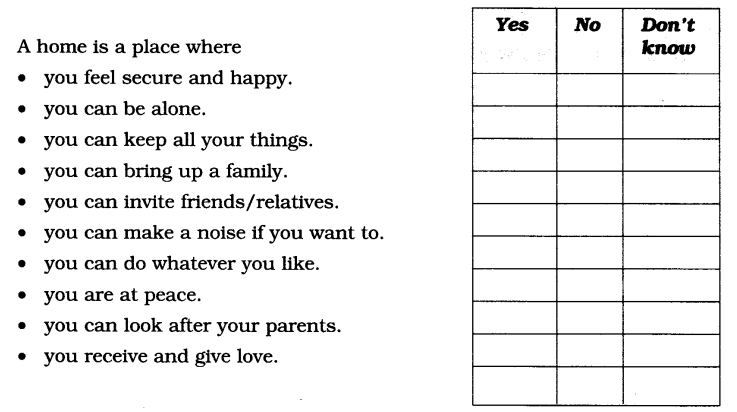NCERT Solutions for Class 7 English Honeycomb Poem Chapter 3 The Shed are part of NCERT Solutions for Class 7 English. Here we have given NCERT Solutions for Class 7 English Honeycomb Poem Chapter 3 The Shed.
| Board | CBSE |
| Textbook | NCERT |
| Class | Class 7 |
| Subject | English Honeycomb (Poem) |
| Chapter | Chapter 3 |
| Chapter Name | The Shed |
| Number of Questions Solved | 6 |
| Category | NCERT Solutions |
NCERT Solutions for Class 7 English Honeycomb Poem Chapter 3 The Shed
STANZAS FOR COMPREHENSION
Read the following extracts and answer the questions that follow by choosing the correct option :
Question 1.
There’s a shed at the bottom of our garden
With a spider’s web hanging across the door,
The hinges are rusty and creak in the wind.
When I’m in bed I lie and I listen,
I’ll open that door one day.
(Page 48)
Word-Notes : Shed-an old store house, एक पुराना स्टोर घर। At the bottom of-in the lowest part, सबसे निचले भाग में। Spider’s web-मकड़ी का जला। Hanging-suspended in the air, हवा में लटका हुआ। Across-from one side to the other, आर-पार/एक सिरे से दूसरे सिरे तक। Hinges-joints, कब्जे। Rusty–having rust, जंग लगे। Creak-make a harsh sound, चरमराते हैं।
हिन्दी अनुवाद : हमारे बगीचे के निचले भाग में एक स्टोर है जिसमें दरवाजे के एक सिरे से लेकर दूसरे सिरे तक एक मकड़ी का जाला लटक रहा है, (दरवाजे के) कब्जों में जंग लग चुकी है और वे हवा में चरमराते हैं। बिस्तर में लेटा मैं सुनता रहता हूँ, एक दिन मैं दरवाजा खोलूंगा।
Paraphrase : The location of the shed is at the bottom of the garden. A spider’s web is seen hanging across the door. When the wind blows, the creaking sound of the rusty hinges attracts the poet’s attention. The poet is in a relaxed mood as he is now in bed and plans to satisfy his curiosity to see what is hidden inside the shed.
Multiple Choice Questions
Question 1.
The shed is located at
(a) the end of the garden
(b) the lower point
(c) the tip point
(d) the point of the garden
Answer.
(d) the point of the garden
Question 2.
The shed has remained
(a) unattended
(b) locked for long
(c) unpainted
(d) dusty
Answer.
(b) locked for long
Question 3.
Across the door, one can see
(a) a rusty chain
(b) a painting
(c) paper frills
(d) the web of a spider
Answer.
(d) the web of a spider
Question 2.
There’s dusty old window around at the side
With three cracked panes of glass.
I often think there’s someone staring at me
Each time that I pass,
I’ll peep through that window one day.
(Page 49)
Word-Notes : Dusty-covered with dust, धूल भरी। Around-close, निकट। Cracked-broken, टूटी। Panes—windowpanes, खिड़की के शीशे। Staring-looking intently, घूर रहा। Peep-look through, झांकना।
हिन्दी अनुवाद : एक तरफ एक धूल भरी पुरानी खिड़की है जिसके तीन शीशे टूटे (चटके) हुए हैं। अक्सर मुझे लगता है कि कोई मेरी ओर घूर कर देख रहा है। ऐसा हर बार होता है जब मैं उधर से गुजरता हूँ एक दिन मैं इस खिड़की से अंदर झाँचूँगा।
Paraphrase : The window that is quite old is covered with dust. Even the three glass panes are seen cracked. The poet thinks that someone is staring at him whenever he happens to pass the shed. He is sure that one day he will peep through the broken window to satisfy his curiosity.
Questions.
1. What is being described in the above passage ?
2. What does the third line show about the speaker’s mind ?
3. Do you think the place is of daily use ? Give a reason for your answer.
Answers.
1. An old shed in the garden is described here.
2. The third line shows that there is fear in the speaker’s mind.
3. No the place is not of daily use. The fact that the old window was dusty and had three cracked panes, reveals it.
Question 3.
My brother says there’s a ghost in the shed
Who hides under the rotten floorboards,
And if I ever dare to set foot inside
He’ll jump out and chop off my head,
But I’ll take a peek one day.
(Page 49)
Word-Notes : Ghost-spirit, भूत। Hides conceals, छिपाता है। Rotten-decomposed, सड़े हुए। Floorboards-the wooden covering of the floor, फर्श पर लगी लकड़ी। Dare-have courage, हिम्मत करना। To set foot-to step in, पैर रखना। Chop off-cut and separate, काट कर अलग करना। Take a peek-look in, अंदर झांकना।
हिन्दी अनुवाद : मेरा भाई कहता है कि स्टोर के अंदर एक भूत है जो फर्श की सड़ी लकड़ी के अंदर छिपा हुआ है, और अगर मैंने कभी अंदर जाने की हिम्मत की तो वह कूद कर बाहर आ जायेगा और मेरा सिर काटकर अलग कर देगा, पर मैं एक दिन अंदर देखेंगा ज़रूर।।
Paraphrase : The poet’s brother tells him that there is a ghost in the shed who lives under the rotten floor boards. If the poet accidentally steps over them, the ghost will jump out and cut off his head. The poet is partially frightened but he does not completely believe his brother and has a plan to look through the broken window one day.
Multiple Choice Questions
Question 1.
The ghost lives under the wooden covering
(a) of the board
(b) of the shed
(c) of the door
(d) of the floor
Answer.
(d) of the floor
Question 2.
It will jump out to
(a) injure him
(b) kill him
(c) cut off the poet’s head
(d) shake hands
Answer.
(c) cut off the poet’s head
Question 3.
‘Dare to set foot inside’ means
(a) go inside
(b) to open the window
(c) put one foot forward
(d) daring act
Answer.
(a) go inside
Question 4.
I know that there isn’t really a ghost,
My brother tells lies to keep the shed for his den;
There isn’t anyone staring or making strange noises
And the spider has been gone from his web
Since I don’t know when,
I’ll go into that shed one day soon,
But not just yet…
(Page 49)
Word-Notes : Keep-have, रखना। Den-lair/a place to hide, माँद /छिपने की जगह/एकांत निजी स्थान। Not just yet-not now, अभी नहीं।
हिन्दी अनुवाद : मैं जानता हूँ कि वास्तव में भूत नहीं होता है, स्टोर को अपने अधिकार में रखने के लिए मेरा भाई झुठ बोलता है ; न तो कोई घूर रहा है और न ही विचित्र-विचित्र आवाजें कर रहा है और मकड़ी, मुझे नहीं पता कब, अपना जाल छोड़कर वहाँ से चली गयी है। मैं एक दिन स्टोर में जरूर जाऊँगा, पर अभी तो नहीं…..
Paraphrase : The poet is aware of the clever designs of his brother who tells him not to enter the store because there is a ghost who lives there. He tells lies so that he could have the shed for himself. The poet knows well that there is no one in the shed who is staring at the poet or is making strange noises. He has also observed that even the spider has left its web but he is not sure of the time of its relinquishing it. He does not plan to enter the shed in the present but will certainly do that in the future.
Questions.
- What does the speaker’s brother tell him ?
- Why does he tell a lie ?
- Do you think that the speaker has really no fear or is he simply trying to be courageous ?
Answers.
- The speaker’s brother tells him that there is a ghost inside the shed.
- He tells a lie to keep the speaker away from the shed.
- In fact, the speaker has fear on his mind. In the second stanza he has said that some
one seems to be staring at him from the shed. So in this stanza, he is trying to fight his fear and be courageous.
TEXTUAL QUESTIONS
(Page 49)
Working with the Poem
Question 1.
Answer the following questions :
(i) Who is the speaker in the poem ?
(ii) Is she/he afraid or curious, or both ? (Imp.)
(iii) What is she/he planning to do soon ?
(iv) “But not just yet…” suggests doubt, fear, hesitation, laziness or something else. Choose the word which seems right to you. Tell others why you chose it.
Answer.
(i) A child is the speaker in the poem.
(ii) She/he is both, afraid and curious.
(iii) She/he is planning to look into the shed soon.
(iv) The phrase suggests hesitation. He hesitates to expose his brother. He wants to keep him away from the shed.
Question 2.
Is there a room in your house or a house in your neighbourhood/locality where you would rather not go alone, and never at night ? If there is such a place and a story to go with it, let others hear all about it.
Answer.
There is no such place in my neighbourhood.
Or
I live in a village. There are some ruins of a very old building in our neighbourhood. Nobody knows how old these ruins are but people are afraid to go into it even during the day. We children have been particularly warned not to go there. At night even the village policeman doesn’t go anywhere close to it. They say it is a haunted house and strange things happen there at night.
We hope the NCERT Solutions for Class 7 English Honeycomb Poem Chapter 3 The Shed help you. If you have any query regarding NCERT Solutions for Class 7 English Honeycomb Poem Chapter 3 The Shed, drop a comment below and we will get back to you at the earliest.

